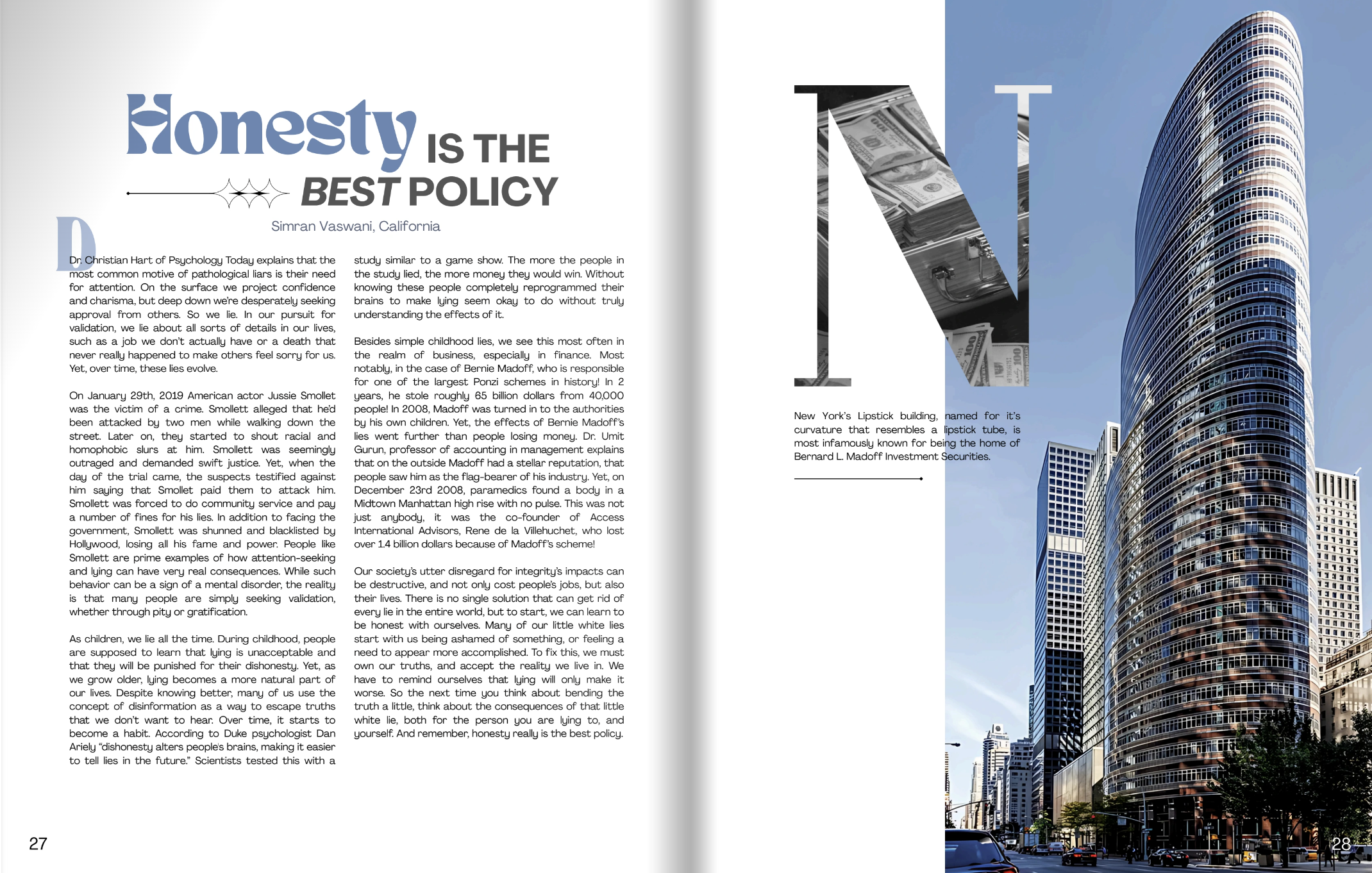Honesty is the Best Policy
View article in Magazine.Dr. Christian Hart of Psychology Today explains that the most common motive of pathological liars is their need for attention. On the surface we project confidence and charisma, but deep down we’re desperately seeking approval from others. So we lie. In our pursuit for validation, we lie about all sorts of details in our lives, such as a job we don’t actually have or a death that never really happened to make others feel sorry for us. Yet, over time, these lies evolve.
On January 29th, 2019 American actor Jussie Smollet was the victim of a crime. Smollett alleged that he’d been attacked by two men while walking down the street. Later on, they started to shout racial and homophobic slurs at him. Smollett was seemingly outraged and demanded swift justice. Yet, when the day of the trial came, the suspects testified against him saying that Smollet paid them to attack him. Smollett was forced to do community service and pay a number of fines for his lies. In addition to facing the government, Smollett was shunned and blacklisted by Hollywood, losing all his fame and power. People like Smollett are prime examples of how attention-seeking and lying can have very real consequences. While such behavior can be a sign of a mental disorder, the reality is that many people are simply seeking validation, whether through pity or gratification.
As children, we lie all the time. During childhood, people are supposed to learn that lying is unacceptable and that they will be punished for their dishonesty. Yet, as we grow older lying becomes a more natural part of our lives. Despite knowing better, many of us use the concept of disinformation as a way to escape truths that we don’t want to hear. Over time, it starts to become a habit. According to Duke psychologist Dan Ariely “dishonesty alters people's brains, making it easier to tell lies in the future.” Scientists tested this with a study that was similar to a game show. The more the people in the study lied the more money they would win. Without knowing these people completely reprogrammed their brains to make lying seem okay to do without truly understanding the effects of it.
Besides simple childhood lies, we see this most often in the realm of business, especially in finance. Most notably, in the case of Bernie Madoff, who is responsible for one of the largest Ponzi schemes in history! In 2 years, he stole roughly 65 billion dollars from 40,000 people! In 2008, Madoff was turned in to the authorities by his own children. Yet, the effects of Bernie Madoff’s lies went further than people losing money. Dr. Umit Gurun, professor of accounting in management explains that on the outside Madoff had a stellar reputation, that people saw him as the flag-bearer of his industry. Yet, on December 23rd 2008, paramedics found a body in a Midtown Manhattan high rise with no pulse. This was not just anybody, it was the co-founder of Access International Advisors, Rene de la Villehuchet, who lost over 1.4 billion dollars because of Madoff’s scheme!
Our society’s utter disregard for integrity’s impacts can be destructive, and not only cost people’s jobs, but also their lives. There is no single solution that can get rid of every lie in the entire world, but to start, we can learn to be honest with ourselves. Many of our little white lies start with us being ashamed of something, or feeling a need to appear more accomplished. To fix this, we must own our truths, and accept the reality we live in. We have to remind ourselves that lying will only make it worse. So the next time you think about bending the truth a little, think about the consequences of that little white lie, both for the person you are lying to, and yourself. And remember, honesty really is the best policy.

